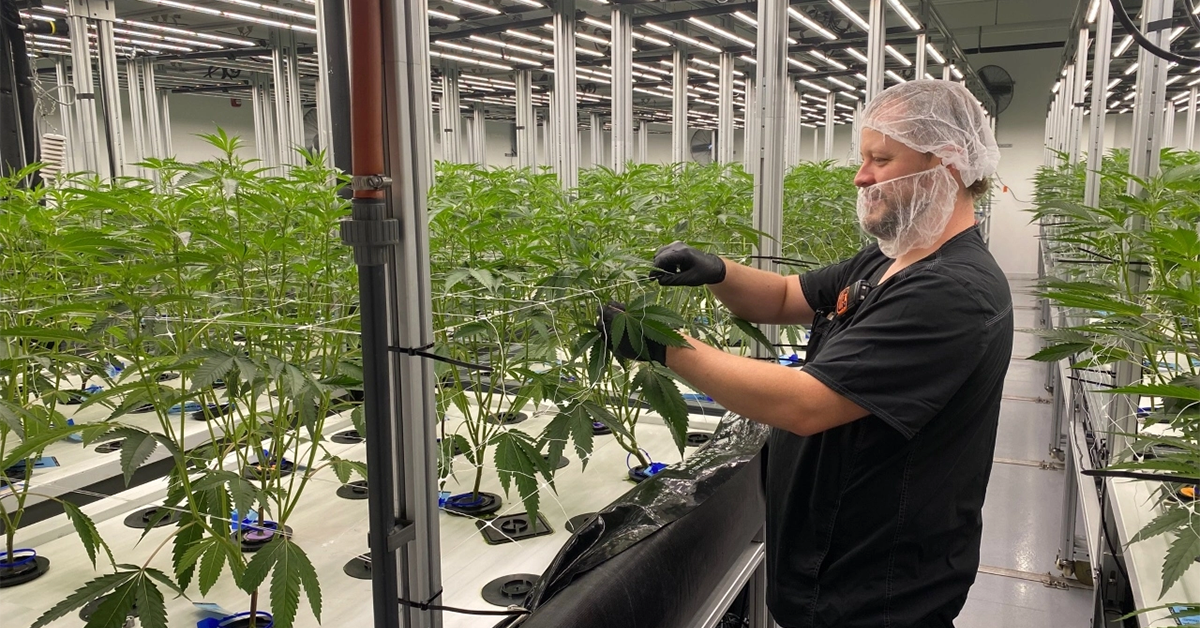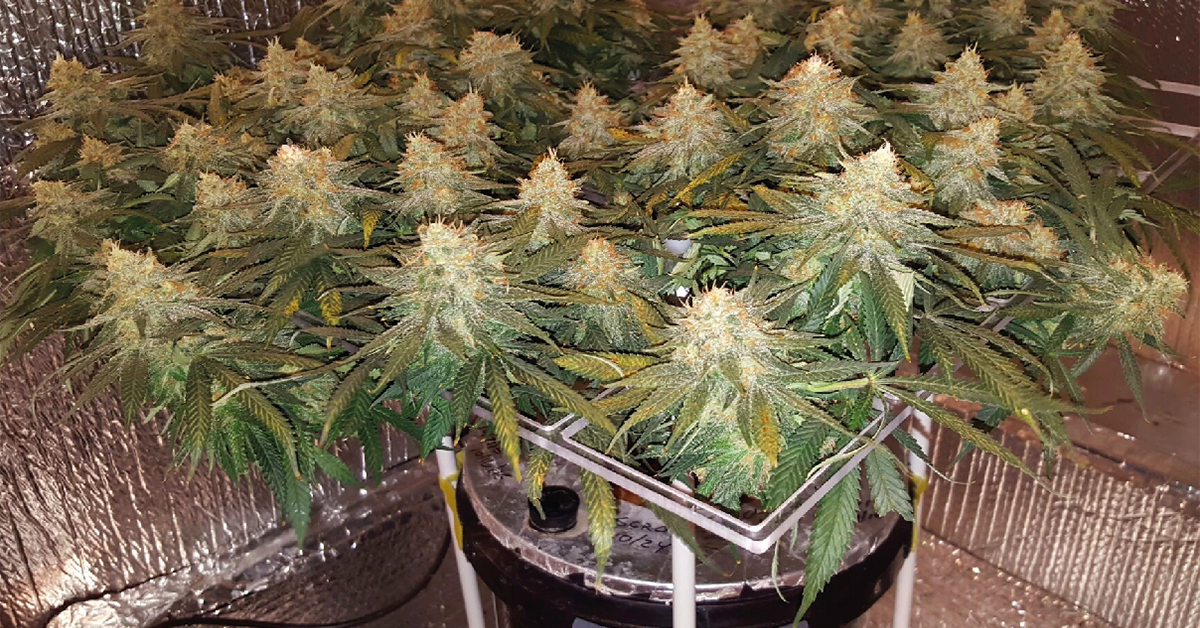Michigan's Aeroponic Marijuana Cultivation: The Future of Cannabis Growth?

In Michigan's dynamic cannabis landscape, growers are eyeing aeroponic techniques as a potentially groundbreaking shift from traditional cultivation methods. Instead of relying on soil-based mediums, such as rockwool or coco coir, aeroponics introduces a system where plant roots, suspended in air, are directly misted with a solution rich in water and essential nutrients.
This method, though revolutionary, isn't merely a novel concept. When married with meticulous environmental controls, aeroponic cultivation pledges not just growth, but accelerated growth. Jim Strain of Dycar Pharmaceuticals, based in Cranbrook, British Columbia, vouches for its efficacy. He states, "Having experimented with a myriad of systems, aeroponics, when flawlessly executed, remains unrivaled in terms of growth speed."
But what does this mean for Michigan's marijuana cultivators? Is aeroponics the next big thing, or just a fleeting trend? As we delve deeper, we'll explore the advantages, challenges, and the potential future of this cultivation technique in the region.
Table of Contents
- The Upside of Aeroponic Marijuana Cultivation in Michigan
- Navigating the Challenges of Aeroponic Cultivation
- The Importance of Clean Systems in Aeroponic Cultivation
- The Future of Aeroponic Cultivation in Michigan's Cannabis Industry
- The Takeaway: Understanding the Paradigm Shift in Cannabis Cultivation with Aeroponics
The Upside of Aeroponic Marijuana Cultivation in Michigan
-
Rapid Growth: At the heart of aeroponic cultivation's allure is its promise of speed. With direct nutrient delivery and optimal environmental conditions, plants can grow at a rate previously thought unattainable in traditional systems. This not only translates to quicker harvests but also increased production cycles within a given timeframe.
-
Economic Benefits: Beyond the growth, aeroponics presents compelling financial arguments. With the elimination of soil or other growth mediums, material costs see a marked reduction. Additionally, the method's efficiency can potentially lead to decreased labor costs, especially when using advanced automated systems.
-
Quality Assurance: For marijuana connoisseurs and casual consumers alike, quality is paramount. Aeroponically grown cannabis is often cited to have a premium profile, resulting in high-quality buds. With a direct and consistent nutrient delivery system, growers have observed improved cannabinoid profiles, including higher THC content and richer terpenes. This quality isn't just about potency but extends to flavor, aroma, and overall user experience.
Chris Wrenn from California's AessenceGrows, a company at the forefront of providing aeroponic systems, emphasizes their commitment to quality. "Our target clientele," Wrenn notes, "are those dedicated to producing the crème de la crème of cannabis."
Michigan's own Rair Co., based in Jackson, serves as a testament to aeroponic success. Partnering with AessenceGrows, Rair Co. has consistently reported impressive growth rates and premium cannabis output, setting benchmarks for what's achievable with aeroponics in the region.
Navigating the Challenges of Aeroponic Cultivation
While the benefits of aeroponics are undeniably enticing, adopting this method comes with its own set of hurdles:
-
Initial Investment: Transitioning to or starting an aeroponic system necessitates a considerable upfront financial outlay. This includes the cost of specialized equipment and setup. For many cultivators, especially smaller operations, this can pose a significant barrier to entry.
-
The Learning Curve: Any change demands adaptation. Traditional growers venturing into aeroponics must acquaint themselves with new technology and refine their cultivation techniques to suit this method. While some might find this transition smooth, others may face challenges in mastering the nuances of aeroponic systems.
-
Maintenance and Cleanliness: In aeroponics, the stakes for cleanliness are exponentially high. Given that the system relies on water recirculation, even a minor oversight can lead to the rapid spread of pathogens. This calls for stringent sanitation practices and regular system checks to ensure optimal plant health and prevent potential outbreaks.
Tim Bogaert of Rair Co. sheds light on these challenges, stating, "The upfront costs are undoubtedly a deterrent for many. But beyond that, there's a mindset shift required." He emphasizes the need for adaptability and an open-minded approach, especially given how distinct aeroponics is from traditional cultivation methods.
Moreover, with the potential risk of disease spread in recirculating water systems, many cultivators exercise caution. Dycar's past experience with a black root rot outbreak underscores the critical importance of vigilance and proactive measures in aeroponic cultivation. The incident, attributed to an infected plant, became a lesson in the necessity of stringent sanitation measures and informed choices in plant sourcing.
In essence, while the advantages of aeroponics are manifold, its adoption requires a balanced consideration of both its potential rewards and the challenges that come with it.
The Importance of Clean Systems in Aeroponic Cultivation
A successful aeroponic cultivation hinges on maintaining an environment that's not just conducive for plant growth, but one that's meticulously clean and free from potential contaminants.
-
Water Recirculation Concerns: A key component of many aeroponic systems is the recycling of water, a method that's both resource-efficient and environmentally responsible. However, this very feature can become a double-edged sword. Strain from Dycar highlights the vulnerability of these recirculating water systems, noting that they can quickly become a breeding ground for pathogens like pythium. "If one infected plant introduces a pathogen into your system, it can rapidly spread, affecting the entire crop," he warns.
-
Dealing with Outbreaks: Even with the best precautions, the risk of disease outbreaks remains. Dycar's encounter with black root rot in 2019 serves as a cautionary tale. Addressing such challenges requires swift and decisive action. In Dycar's case, they chose to eliminate an entire room of plants as a preventative measure, underscoring the lengths cultivators might have to go to ensure product safety.
-
Strict Sanitation Protocols: The emphasis on cleanliness goes beyond mere regular cleaning. Rair's Bogaert points out that simply flushing cleaning solutions isn't enough. Physical brushing, targeting accumulated biofilm from root exudates and other plant materials, is essential. He affirms, "To maintain a pristine system, rigorous cleaning procedures are non-negotiable."
-
Advantages of a Clean Environment: While maintaining a clean environment is labor-intensive, the results are unequivocal. Strain boasts, "Our stringent sanitation practices mean we consistently produce cannabis with zero microbials. We've never had to irradiate our product." Furthermore, aeroponic systems that adhere to such high cleanliness standards can be primed to meet rigorous requirements like the European Union Good Manufacturing Practice, a testament to the method's potential for premium production.
The aeroponic method, much like any high-performance machine, requires specialized care and attention. Strain likens it to a Ferrari, suggesting that if you want unparalleled results, you need the right team — both a skilled mechanic and an adept driver. In the context of cannabis cultivation, this translates to expertise in the system and a thorough understanding of the unique challenges and demands of aeroponic cultivation.

The Future of Aeroponic Cultivation in Michigan's Cannabis Industry
The rapid strides in aeroponic cultivation paint a promising picture, especially for a burgeoning cannabis market like Michigan. As the industry evolves, it's vital to consider both the potential and the pitfalls of this advanced cultivation method.
-
Consistent, Quality Production: One of the key attractions of aeroponics is the ability to produce a consistent, high-quality crop. Strain notes that aeroponic cultivation results are "extraordinarily repeatable." This consistency can be a significant asset for producers, especially when trying to establish a trustworthy brand in Michigan's competitive cannabis market.
-
The Need for Expertise: Despite the advancements in aeroponic technology and automation, it's not a hands-off method. Strain emphasizes that adopting aeroponics isn't as simple as setting up the system and then letting it run. "It's not set-it-and-forget-it," he clarifies. This underscores the importance of training, expertise, and continuous oversight in ensuring the success of an aeroponic venture.
-
Weighing the Costs and Benefits: For many Michigan cultivators, the decision to adopt aeroponics will come down to a careful evaluation of costs versus benefits. While the method promises reduced labor costs in the long run and potential savings on materials, the initial investment can be substantial.
-
Positioning for the Premium Market: Chris Wrenn of AessenceGrows believes that aeroponics is tailor-made for cultivators aiming for the top-tier market. "Our niche is for those looking to produce the best cannabis out there," he states. This sentiment resonates with Michigan's discerning cannabis consumers who are willing to pay a premium for superior quality.
In conclusion, as Michigan's cannabis landscape continues to flourish, aeroponic cultivation stands out as a promising avenue for those willing to invest in the future. The method offers unparalleled growth rates, premium quality, and operational efficiencies. Yet, it requires a commitment to learning, investing, and maintaining high standards. For Michigan cultivators eyeing the top echelons of the cannabis market, aeroponics might just be the game-changer they've been waiting for.
The Takeaway: Understanding the Paradigm Shift in Cannabis Cultivation with Aeroponics
Navigating the complexities of the ever-evolving Michigan cannabis industry requires both innovation and insight. The introduction and progression of aeroponic cultivation represent a transformative shift in how we approach cannabis farming. Here's a distilled takeaway for prospective cultivators, investors, and enthusiasts:
-
Embrace Change and Innovation: The traditional methods of cannabis cultivation have served the industry well for years. However, as the Michigan market matures and becomes more competitive, there's an increasing need for differentiation. Aeroponic cultivation isn't just another method; it's a statement about embracing forward-thinking practices.
-
Prioritize Quality and Safety: With aeroponics, the stakes are high, but so are the rewards. The method promises top-tier cannabis produce, but it demands stringent adherence to cleanliness and quality controls. This isn't just about producing premium cannabis; it's also about ensuring the safety and well-being of consumers.
-
Educate and Invest in Talent: The intricacies of aeroponic systems require specialized knowledge. Investing in the right team, providing them with the necessary training, and fostering an environment of continuous learning will be pivotal. As Jim Strain aptly put it, if you have a Ferrari-like system, you need both a skilled mechanic and a seasoned driver.
-
Anticipate the Challenges: While the benefits of aeroponics are manifold, it's crucial to remain grounded and aware of the challenges. From steep initial investments to the need for continual oversight, prospective aeroponic cultivators need a clear-eyed evaluation of what lies ahead.
-
Stay Committed to Excellence: The Michigan cannabis industry is not just about quantity; it's about delivering a quality experience. As Chris Wrenn of AessenceGrows highlights, their target market is those looking to grow "the best cannabis out there." For those willing to make the commitment, aeroponic cultivation offers a pathway to that pinnacle.
In sum, as the cannabis industry in Michigan and beyond continues to evolve, so too must our cultivation practices. Aeroponics presents not just an opportunity for growth but a challenge to redefine what excellence means in cannabis cultivation. The future is bright for those ready to rise to the occasion.
Share this article:
Spotted a typo, grammatical error, or a factual inaccuracy? Let us know - we're committed to correcting errors swiftly and accurately!








 Helpful Links
Helpful Links